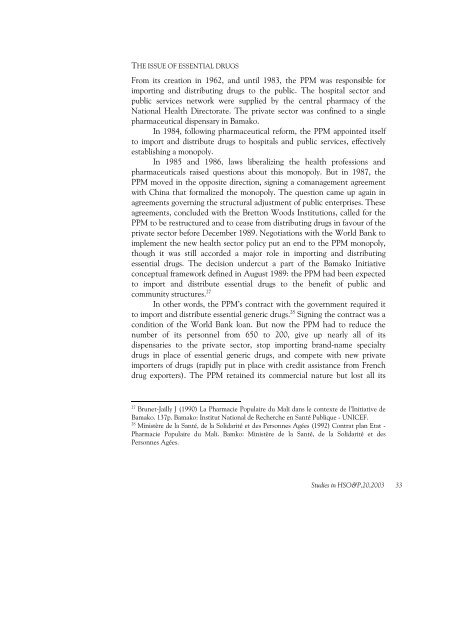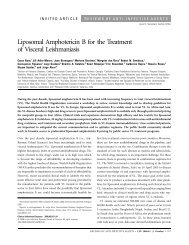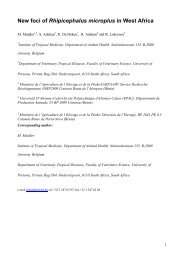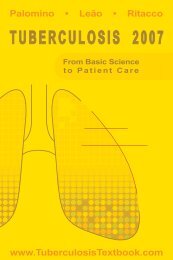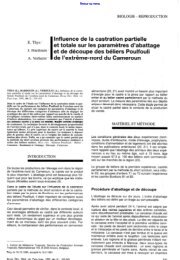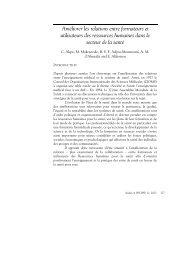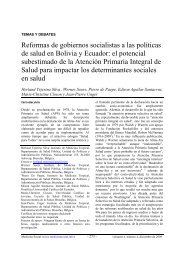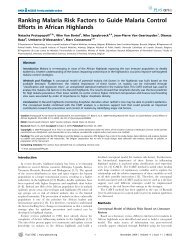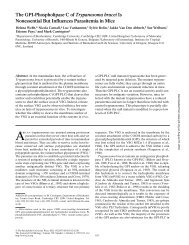Health sector reform in Mali, 1989-1996 - TropMed Central Antwerp ...
Health sector reform in Mali, 1989-1996 - TropMed Central Antwerp ...
Health sector reform in Mali, 1989-1996 - TropMed Central Antwerp ...
Create successful ePaper yourself
Turn your PDF publications into a flip-book with our unique Google optimized e-Paper software.
THE ISSUE OF ESSENTIAL DRUGS<br />
From its creation <strong>in</strong> 1962, and until 1983, the PPM was responsible for<br />
import<strong>in</strong>g and distribut<strong>in</strong>g drugs to the public. The hospital <strong>sector</strong> and<br />
public services network were supplied by the central pharmacy of the<br />
National <strong>Health</strong> Directorate. The private <strong>sector</strong> was conf<strong>in</strong>ed to a s<strong>in</strong>gle<br />
pharmaceutical dispensary <strong>in</strong> Bamako.<br />
In 1984, follow<strong>in</strong>g pharmaceutical <strong>reform</strong>, the PPM appo<strong>in</strong>ted itself<br />
to import and distribute drugs to hospitals and public services, effectively<br />
establish<strong>in</strong>g a monopoly.<br />
In 1985 and 1986, laws liberaliz<strong>in</strong>g the health professions and<br />
pharmaceuticals raised questions about this monopoly. But <strong>in</strong> 1987, the<br />
PPM moved <strong>in</strong> the opposite direction, sign<strong>in</strong>g a comanagement agreement<br />
with Ch<strong>in</strong>a that formalized the monopoly. The question came up aga<strong>in</strong> <strong>in</strong><br />
agreements govern<strong>in</strong>g the structural adjustment of public enterprises. These<br />
agreements, concluded with the Bretton Woods Institutions, called for the<br />
PPM to be restructured and to cease from distribut<strong>in</strong>g drugs <strong>in</strong> favour of the<br />
private <strong>sector</strong> before December <strong>1989</strong>. Negotiations with the World Bank to<br />
implement the new health <strong>sector</strong> policy put an end to the PPM monopoly,<br />
though it was still accorded a major role <strong>in</strong> import<strong>in</strong>g and distribut<strong>in</strong>g<br />
essential drugs. The decision undercut a part of the Bamako Initiative<br />
conceptual framework def<strong>in</strong>ed <strong>in</strong> August <strong>1989</strong>: the PPM had been expected<br />
to import and distribute essential drugs to the benefit of public and<br />
community structures. 27<br />
In other words, the PPM’s contract with the government required it<br />
to import and distribute essential generic drugs. 28 Sign<strong>in</strong>g the contract was a<br />
condition of the World Bank loan. But now the PPM had to reduce the<br />
number of its personnel from 650 to 200, give up nearly all of its<br />
dispensaries to the private <strong>sector</strong>, stop import<strong>in</strong>g brand-name specialty<br />
drugs <strong>in</strong> place of essential generic drugs, and compete with new private<br />
importers of drugs (rapidly put <strong>in</strong> place with credit assistance from French<br />
drug exporters). The PPM reta<strong>in</strong>ed its commercial nature but lost all its<br />
27 Brunet-Jailly J (1990) La Pharmacie Populaire du <strong>Mali</strong> dans le contexte de l’Initiative de<br />
Bamako. 137p. Bamako: Institut National de Recherche en Santé Publique - UNICEF.<br />
28 M<strong>in</strong>istère de la Santé, de la Solidarité et des Personnes Agées (1992) Contrat plan Etat -<br />
Pharmacie Populaire du <strong>Mali</strong>. Bamko: M<strong>in</strong>istère de la Santé, de la Solidarité et des<br />
Personnes Agées.<br />
Studies <strong>in</strong> HSO&P,20,2003 33


